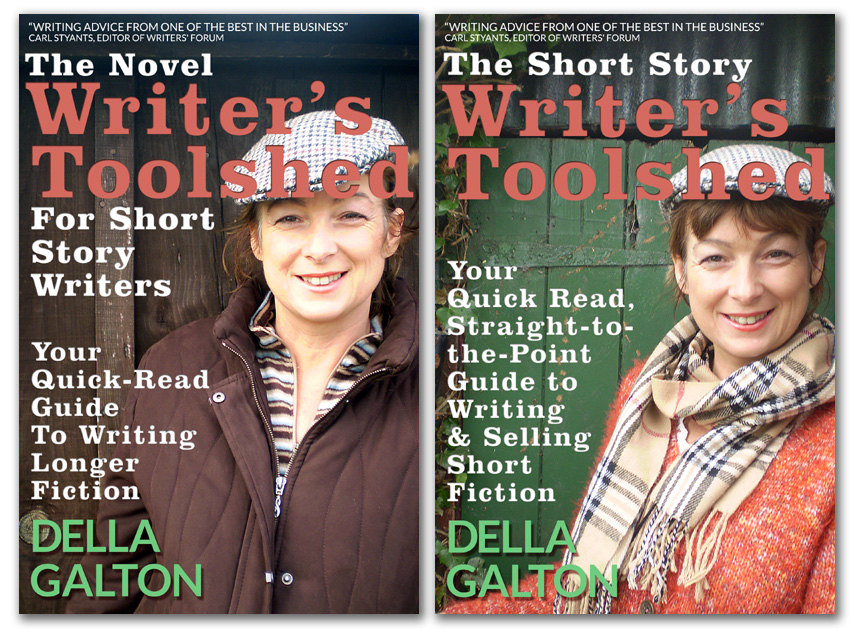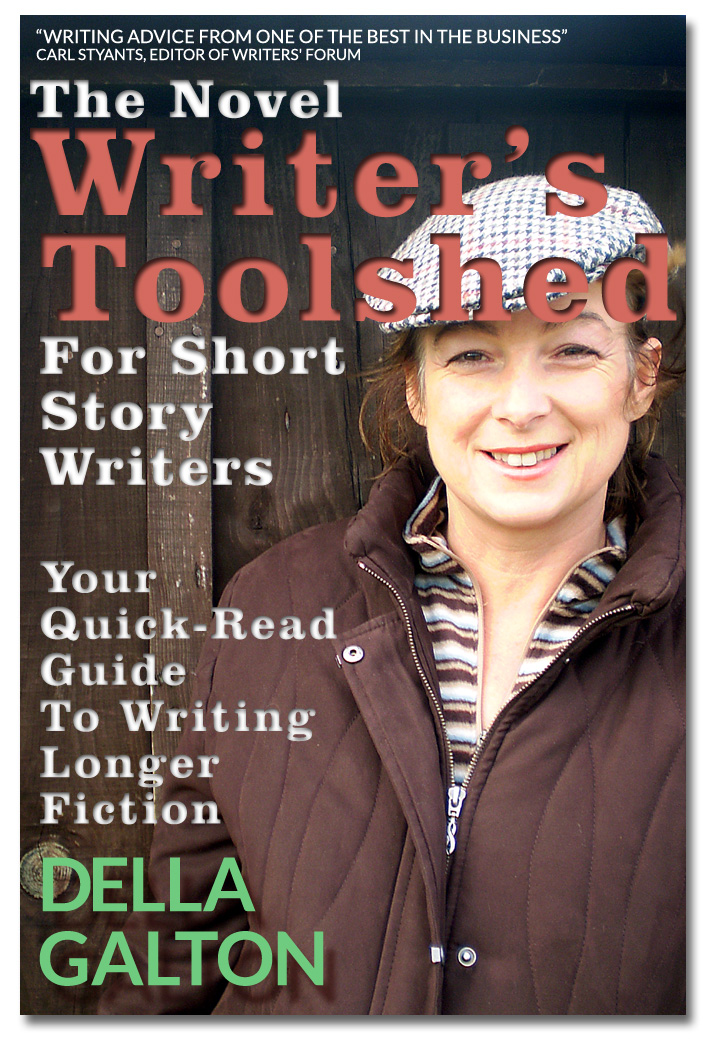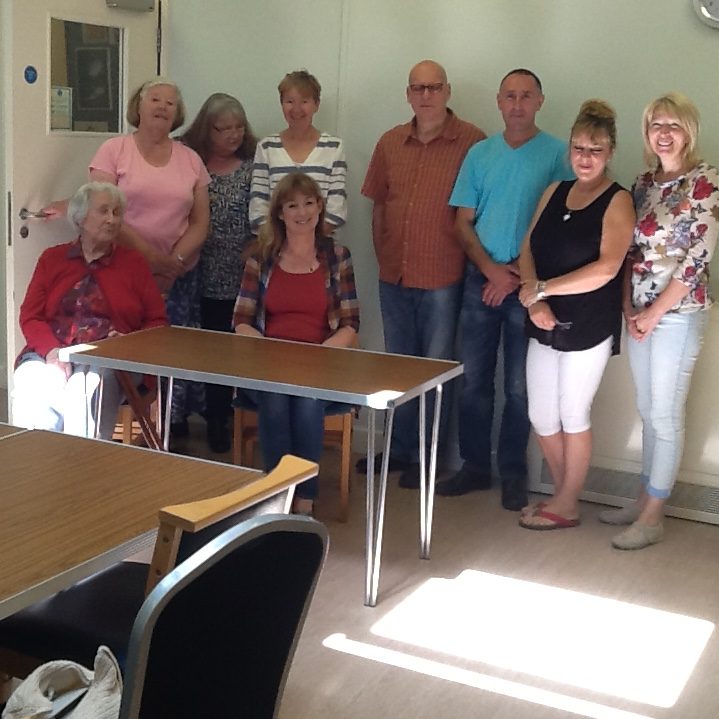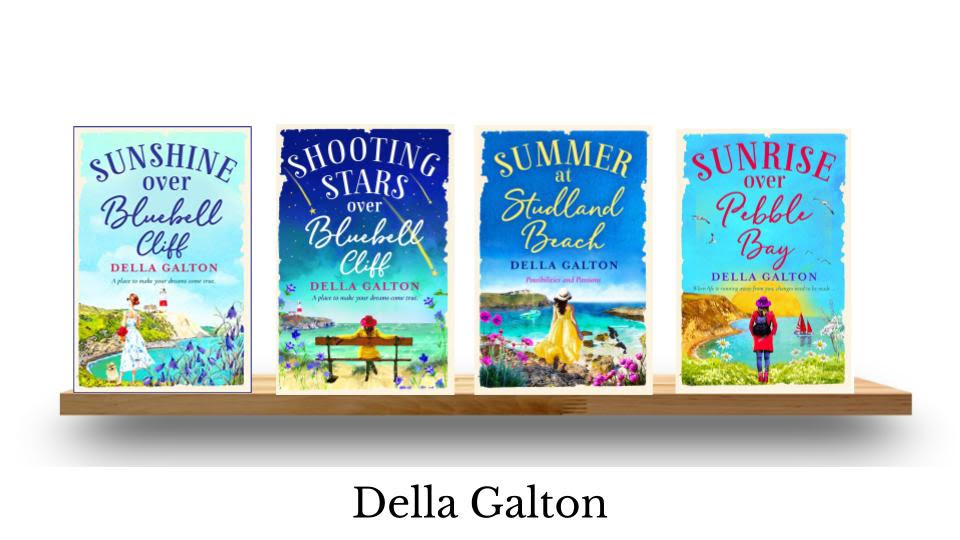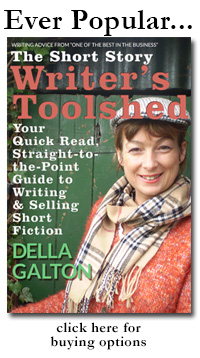
Just in case anyone fancies a preview of my new novella, Shadowman, here’s the blurb and first chapter 🙂
Karen and Rob’s show-jumping yard is in trouble. And so is their marriage.
Then someone starts sending anonymous letters. They seem to have an enemy who is determined to wreck their lives, but who? Is it a vindictive stranger or could it be someone closer to home? Karen is determined to find out before she loses everything she loves.
Previously only available as a large print paperback, ‘Shadowman’ by Della Galton is now available as an ebook novella from amazon (.co.uk | .com)
Chapter One
It was a beautiful day. Autumn was just beginning to steal across the forest, turning the trees shades of red and gold, but I shivered as I leaned on the five bar gate that separated our land from the tangle of woodland that lay beyond. I had to talk to Rob again. Find a way to make him understand how worried I was that if we didn’t do something soon, we were going to lose all that we’d worked for. It wasn’t going to be easy. Rob and I didn’t have the same attitude to money. I was used to having a nest egg in the bank – I needed the cushion of financial security. Rob had an easy come, easy go attitude. To everything, I was beginning to think.
The differences between us hadn’t been so apparent when we’d first married. But lately things had been tough, financially. We’d had a couple of big bills we hadn’t budgeted for. Murphy, one of our horses, had been spooked by a backfiring car and had run into a barbed wire fence. The vet’s bill had been horrendous and it had taken weeks of care to get him right again. Then we’d had a drainage problem in the stable yard and the builder had discovered subsidence, which had cost a fortune to sort out. We’d used our savings and now we were deep into our overdraft and every time I raised the subject, Rob told me I worrying too much.
“Things aren’t that bad, Karen,” he said later that evening. “The bank’s hardly going to foreclose on us, are they?”
He smiled as he spoke, his eyes confident. There wasn’t a trace of grey in his black hair, not a trace of worry.
“We can’t just keep on borrowing. I think we ought to do something more positive.”
“Like what?” He raised his eyebrows and I took a deep breath because he definitely wasn’t going to like what I had in mind.
“We could sell a horse.”
“That’s not going to make much difference.”
“It would if it was the right horse. Ben Darley phoned me this morning. He saw you riding Shadowman at Lulworth last week. He wants to buy him.”
“Does he?” Rob’s eyes narrowed speculatively. “What’s he offering?”
I told him and he whistled. “If he’s that keen, then he obviously thinks the horse is going to be as good as I do. Excellent.”
“So you’ll think about it?”
“No way. I’m not selling our best horse. It would be madness.”
I sighed and he came round the table and took my hands. “Look at it this way, Karen. If Ben thinks he’s worth that much now, then he’ll be worth even more by the end of the season. I’ve got big plans for Shadowman.”
His eyes were sparkling, his face animated as it always was when he talked about the horse he’d reared from a gangly long legged foal, and I knew I’d lost the battle, at least for now.
“It’s going to be fine, Karen, I promise.” He went across the kitchen, dragged his coat from the back door and shrugged it on. “Look, I’d better do the evening feeds; we’ll talk some more later.”
I nodded, even though I knew we wouldn’t. Rob hated talking about money. It was ironic really; Rob had been brought up with next to none and I’d always taken things like holiday homes, private schools and my own pony for granted, but I was the one who constantly worried about it.
The only thing Rob wasn’t laid back about was his riding. He dreamed of being in the British show jumping team one day and he was probably good enough to do it. The first time I’d seen him ride we’d been competing against each other in the same show jumping class.
“That’s the one you want to watch,” Mum had said, as we walked the course, and I’d looked at the tall, dark haired man strolling ahead of us.
“I don’t think I’ve seen him before. Who is he?”
“Rob Patterson, he’s a bit of a rough diamond, but he can ride. He beat Suzy Canton last week, effortlessly, if the rumour mill’s to be believed. Caused quite a stir.” She patted her hair and raised her perfectly plucked eyebrows.
I hadn’t taken much notice of the rough diamond bit. Mum’s always been a snob, but I’d watched Rob jump a perfect clear round, with growing interest.
He was an instinctive rider, so much a part of the horse, that it had been breathtaking to watch him.
“Must be a good horse,” I’d murmured, but Mum shook her head.
“It’s not his. Belongs to some small yard the other side of Salisbury. He’d never sat on its back until a week ago, apparently. The girl who normally rides it had a fall and couldn’t jump today.”
I remember thinking that it must have been a lucky round, but that was before he beat me by a good ten seconds in the jump off.
As we lined up to collect our rosettes, Rob glanced across at me and nodded an acknowledgment. “Nice mare, you’ve got there,” he said, and I could feel myself softening beneath his gaze. “See you again, I hope.”
And then he was gone, cantering ahead of me around the ring and I thought, oh yes, I’d very much like to see him again. And not just on a horse.
A couple of weeks later we competed against each other again – he won that class too – and this time he asked me for a celebration drink. That was how it had begun. We’d soon discovered we were opposites in every way. Looks, backgrounds and personalities. I’d led a pretty sheltered life, really, I’d had relationships before Rob, but I’d never fallen in love, never wanted to get married. He’d said it was the same for him, but I wasn’t so sure. Rob could have had his pick of women. Why had he chosen me?
Deep down, I’d always been afraid it wouldn’t last, that our differences would somehow drive a wedge between us, and I had a horrible feeling that it was beginning to happen.
Nothing’s ever as bad in daylight as it seems in darkness, is it? As I crunched across the grass to check the horses’ water troughs the following morning, I felt my spirits lift. Maybe Rob was right. Shadowman would certainly be worth a lot more if they had another good season and there was no reason why they shouldn’t.
Besides, it was hard to feel depressed out here in the crystal air. The first thick frost had silver-plated the grass and villages of bejewelled spider’s webs sparkled in the hedgerows. The sun, which hadn’t long risen, slanted across the fields, turning ice crystals to diamonds so it was easy to imagine you were walking through some winter fairyland, a place touched with magic instead of just our back field. I swallowed. I never wanted to leave this place; we had to make it work.
When the estate agent had showed us round two years ago, it had been a bright summer day and we’d fallen in love with the place. The house had needed a fair bit doing, but the stables were beautiful, a white painted block that was big enough for twelve horses. We planned to offer a livery service and we were both qualified riding instructors. We knew it would be tight while we got established, but we thought we could make it work.
The house was on the edge of the New Forest and had only been in our price range because the owner wanted a quick sale, although I was well aware that we couldn’t have afforded it had my parents not given us a hefty deposit as a wedding present and also acted as guarantors for our mortgage. This worried me too, because neither of my parents had accepted Rob at first. I’d felt their unspoken disappointment that I could have done better. They’d come round eventually when they’d seen how serious I was about him. They’d trusted my judgement, both about Rob and my certainty that we could make a success of running our own yard, my parents were like that, but it meant that I couldn’t afford to let them down. Anyway, they couldn’t help us financially any more, even if pride would have let me ask them. Dad’s business hadn’t been too good lately either.
I was on my way back to the stables when my mobile rang.
“Hi, Karen, it’s Lynne, any chance you could turn out my horses. Slight change of plan. I’ve got to go into work today; my boss has called some emergency meeting.”
“Is everything all right?”
“Yeah, well, I hope so.” Lynne sounded distracted and I hung up, hoping that it was. Lynne was our best customer. We had three of her horses, all at full livery, which meant that she paid for us to look after them, although she exercised them herself when she had time.
Another reason things had been a bit tight lately was because we weren’t full. We only had six liveries. Rob had also been pretty busy with Shadowman this summer, going to shows most weekends, which took a lot of time out and was expensive and even though they’d done well, it was mostly investment for the future, not real income.
At four Lynne’s Range Rover drew into the yard, and I smiled as she got out and came across. “Hi, how’s it going?”
“Er, not too good actually.” She brushed a hand through her immaculate blond bob. “Karen, I’m really sorry, but I’m afraid I’ve got some bad news.”
“Oh?” I felt a little shiver run through me.
“Yes, it’s work. That meeting this morning was to tell us that the company has just been bought out. There are going to be quite a few redundancies, and some relocations. I’m one of the relocations. I’ve got to go to Leicester.”
I stared at her in horror. “When?”
“Next month. It means I’m going to have to move the horses. I’m so sorry.”
I touched her arm. “Don’t worry; it’s not your fault. Are you OK? It must have been a huge shock.”
“It was.” She flushed and stared at the ground.
“When do you have to take them?”
“At the end of this week. I’ll pay up to the end of the month, obviously. But I need to put things in motion.”
I wished I could tell her not to bother about the money, but I couldn’t. Anyway there was no point in pretending to Lynne. She was well aware of our financial problems because her father owned the feed merchants, who we always paid at the last possible minute.
“How are things here?”
“So, so.” I forced a smile. “We’ll manage. We always do.”
“I’ll ask Dad to recommend you to his customers. You never know, you might get some replacements pretty quick.”
Even Rob looked worried when I told him this latest development.
“We’ll have to extend the overdraft,” he said. “You can go to the bank; you can sweet talk Jack Dibbens any day.”
I booked an appointment for the following week, but I didn’t feel in the slightest bit confident in my ability to sweet talk anyone as I walked into the branch. Jack Dibbens was young and very shrewd. He was going to see straight through my assurances that this was just a bad patch, especially as I wasn’t sure what we were going to do about it.
He was as polite as ever, though. He pulled out a chair for me and offered me coffee and asked after Rob. Then he steepled his hands on the desk and gave me a serious look.
“Well, I think I can guess why you’re here, Karen.”
God, did I look that desperate? I felt myself redden under his steady gaze.
“We’d like to increase our overdraft. We’ve just lost our best livery owner, which has rather put us out. She had three horses with us.” I stopped gabbling, aware of his growing seriousness.
“I’d heard that things weren’t going well,” he said, at last.
I didn’t answer. News travels like wildfire in our village. It was no surprise that he’d have heard that.
He looked at a sheet of paper on his desk. “However, I am prepared to let you go a bit deeper into the red, if you think it will help?”
“It will,” I murmured, feeling dizzy with relief. “We are going to sort this out. I’m going to persuade Rob to sell a horse.” I told him about Shadowman and he listened, frowning.
Then to my surprise, he said, “I think I’m with your husband on this one. Yards like yours are built on reputations. If you sell your best horse, then you might find you’ve killed the golden goose, so to speak.”
I stared at him. I hadn’t thought of it like that and he smiled.
“Just a suggestion. Karen, there is something else I think you ought to know.” He produced an envelope from a drawer in his desk. “The bank received this a couple of days ago. It was hand delivered.”
I opened it and found a single piece of paper with a typed message.
The Patterson’s are sinking fast. Even their livery owners are leaving. Can your bank afford to throw good money after bad?
A Well Wisher.
Coldness spread through my stomach. It was hard to breathe. I met the bank manager’s concerned eyes.
“If someone sent you this, then why are you lending us more money?”
“I don’t like being told what to do,” he said simply and held out his hand. “Good luck, Karen.”
If you enjoyed chapter one and would like to read the rest you can buy it on amazon (.co.uk | .com) for a very reasonable £1.53. It’s also available in large print format.



